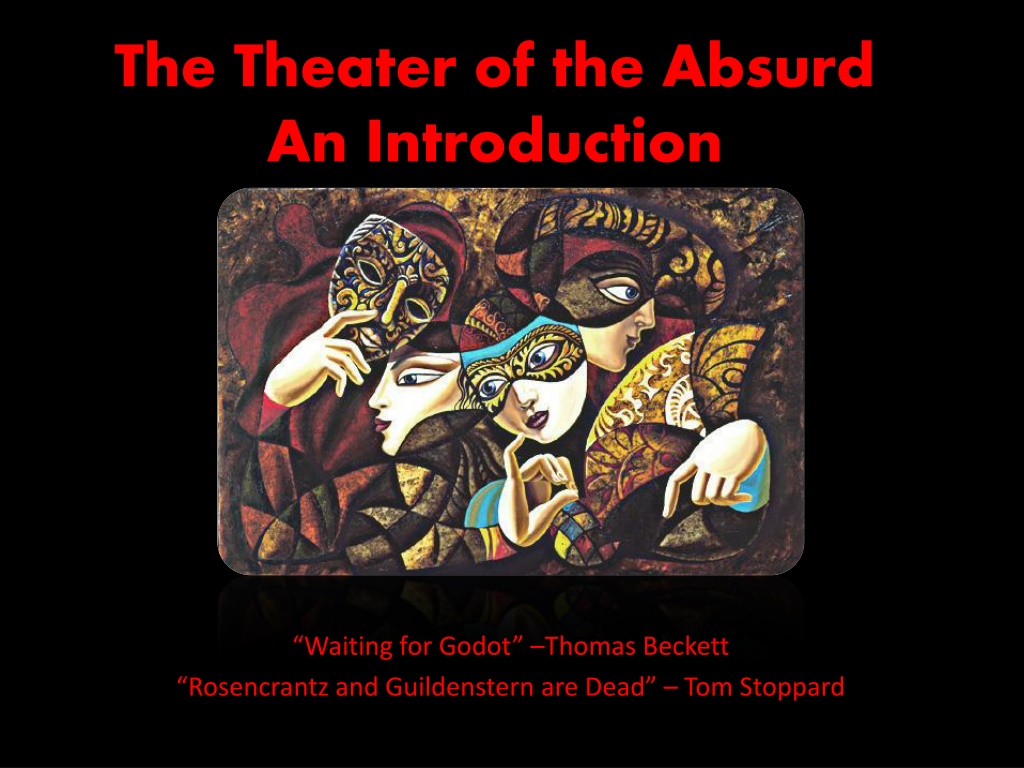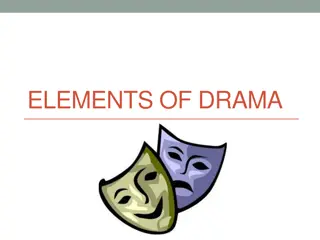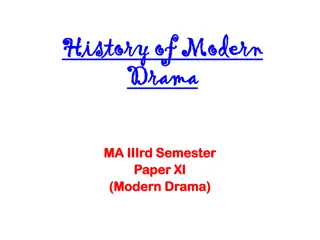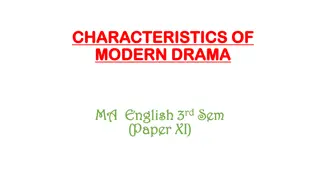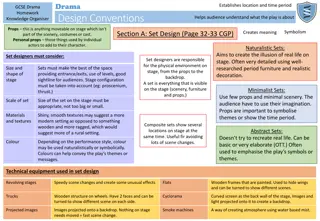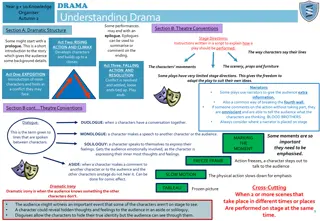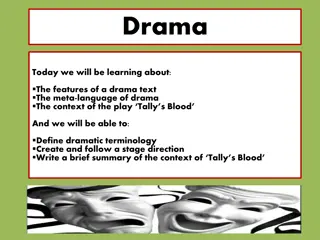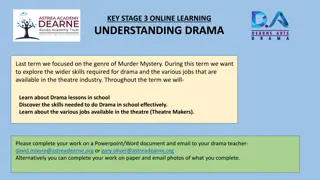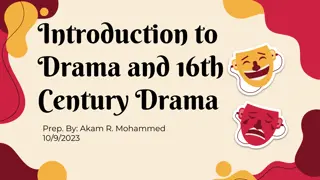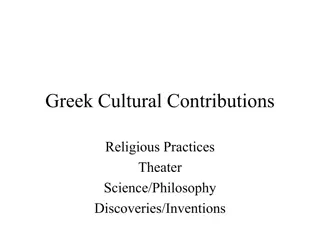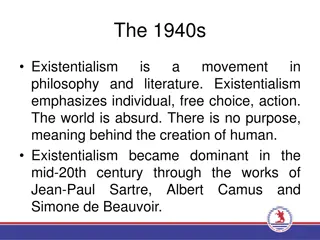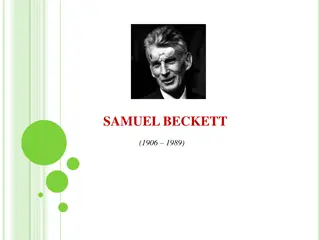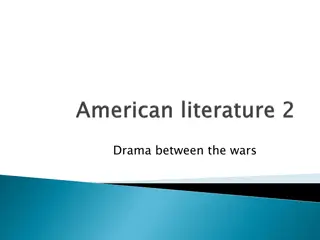Exploring the Theater of the Absurd: An Introduction to Existentialism in Drama
Delve into the intriguing world of the Theater of the Absurd, a significant theatrical movement of the 1950s rooted in Existentialist philosophy. Discover the essence of Absurdism through illogical plots and characters grappling with the absurdity of existence. Learn about key existentialist concepts like the exercise of free will, human responsibility, and the ultimate confrontation with death. Explore the works of influential existentialist philosophers such as Albert Camus and Jean-Paul Sartre, whose ideas shaped the Theatre of the Absurd.
Download Presentation

Please find below an Image/Link to download the presentation.
The content on the website is provided AS IS for your information and personal use only. It may not be sold, licensed, or shared on other websites without obtaining consent from the author. Download presentation by click this link. If you encounter any issues during the download, it is possible that the publisher has removed the file from their server.
E N D
Presentation Transcript
The Theater of the Absurd An Introduction Waiting for Godot Thomas Beckett Rosencrantz and Guildenstern are Dead Tom Stoppard
Background The Theater of the Absurd (aka Absurdism) was a short-lived yet significant theatrical movement, centered in Paris in the 1950s Largely based on the philosophy of Existentialism The typical playgoer had never seen anything like this avant-garde approach to drama Common elements include illogical plots inhabited by characters who appear out of harmony with their own existence
Existentialism A Review Each man exists as an individual in a purposeless universe; he must oppose this hostile environment through the exercise of his free will The existentialist believes that man starts life with nothing. His life is made up of acts; through the process of acting man becomes conscious of his original nothingness. By choosing to act, man passes into the arena of human responsibility which makes him the creator of his own existence. However, the existence inevitably ends with death.
Existentialism Cont. Life becomes meaningless and useless a condition which is in essence absurd Man s only freedom in this condition is the exercise of his conscious mind. However, consciousness means conflict between man s awareness and the absurdity of his existence and his need for justification of his human action.
Existentialism - Important Names Existentialist philosophers Albert Camus and Jean Paul Sartre greatly influenced the TOTA movement Sartre denied the existence of a God, seeing humans with no choice but to create their own standards and moral code in life Camus existential beliefs can be best understood in his book length essay titled The Myth of Sisyphus
The Myth of Sisyphus Sisyphus endlessly pushes a boulder up the top of a mountain only to see it fall again This futile labor is an analogy of man s meaningless existence , a quality seen in many characters and plots of absurdist plays
The Myth of Sisyphus For Camus, the legendary figure of Sisyphus was the prototype of an absurd hero he represents the epitome of futile labor and pointless existence We have already encountered the existential belief system in two major literary figures: Hamlet and Grendel
Grendel The Existentialist Grendel is not invited to be a part of the human experience he is an alien in his own world Gardner claims that a major section of Grendel was taken directly from one of the works of Jean-Paul Sartre: The first major experience in Grendel s life, when he meets human beings for the first time, is all from Being and Nothingness (165, Silesky).
Grendel The Existentialist Grendel realizes when he sees people for the first time that there are forces acting upon him trying to make him conform to a certain cultural standard (i.e. he is evil because he was born evil). What Sartre is saying, is that all societal standards must be brought into question when one takes into account the fact that the universe is based on nothingness. If there are no essentials to society than any that we perceive are only man made and therefore, meaningless (Levy, 111) .
Hamlet The Existentialist To be or not to be? That is the question (3.1.63). Given Hamlet s famous line, how is he experiencing his own existential crisis? Hamlet displays "the existential attitude" throughout the play, especially in his soliloquies
Hamlet The Existentialist In his first soliloquy of Act I, he contemplates the absurdity of the world, How weary, stale, flat and unprofitable Seem to me all the uses of this world (1.2.136-137) ! In Act II, Hamlet speaks with Guildenstern and Rosencrantz, alluding to the existential creation of self, Hamlet tells them, for there is nothing either good or bad but thinking makes it so (2.2.257).
Hamlet The Existentialist Also with Guildenstern and Rosencrantz, Hamlet reflects upon the essence of man, albeit sarcastically, What a piece of work is a man! how noble in reason! how infinite in faculty! in form and moving how express and admirable! in action how like an angel! in apprehension how like a god! the beauty of the world, the paragon of animals! And yet to me what is this quintessence of dust? Man delights not me (2.2.308-313) In this same scene, in a soliloquy, Hamlet contemplates his alienation and his disappointment in his attempts to find his essence: Now I am alone. O, what a rogue and peasant slave am I! (2.2.542-543)
Plot and Structure Anti realistic, going against many of the accepted norms of conventional theatre Labeled by some critics as anti-theatre Often characterized by a deliberate absence of the cause and effect relationship between scenes Non-linear plot developments, sometimes cyclical Deliberate lack of control
Acting and Characterization Sometimes stereotypical or clich d Often an absence of character development Absurd characters lack the motivation found in characters of realistic dramas, highlighting their purposelessness Time, place and identity are frequently blurred with characters often unsure about who or where they are Characters are often our of harmony or out of sync with the world in which they live
Movement Mixture of realistic and non-realistic Elements of circus, vaudeville and acrobatics Ritualistic Slow Illogical Repetitive Action sometimes defies logic or easy understanding
Dialogue Language was devalued as a communication tool (unreliable and distrusted) Often illogical Sometimes telegraphic and clipped Long pauses Clich d Repetitive Rhythmical
Mood and Atmosphere One extreme to another without any notice Often somber and serious, then highly comical
Stagecraft Often simple and minimal use of stagecraft Barren set pieces barely detonating a location The set from the premiere TOTA play, Waiting for Godot by Samuel Beckett
Waiting for Godot Samuel Beckett Samuel Beckett (1906-1989) was born in Ireland and attended Trinity College in Dublin. He spent extensive time in Germany and France, where he finally settled permanently. He took part in the French Resistance against the Nazi occupation during World War II. His most notable works include Waiting for Godot(1953) and Endgame(1958). He received the Nobel Prize for literature in 1969 and died in 1989.
Waiting for Godot Samuel Beckett Beckett was among the mid-twentieth century writers whose work collectively is referred to as the Theater of the Absurd. Influenced by existentialism, they portrayed life as meaningless and produced plays that gave little attention to matters of plot, theme, or characterization. Waiting for Godot is perhaps the most well-known example of this despairing view of the human condition.
Waiting for Godot Characters Estragon (Gogo) - One of two tramps, he is weak and fearful, is obsessed with his physical needs (his sore feet and his hunger), and has a poor memory. Vladimir (Didi)-Estragon s companion of fifty years, he is assertive but no more enlightened than his friend. He is more concerned with metaphysical questions than physical needs. Pozzo - A cruel man who drives his bearer Lucky with a whip and a rope around his neck. He reappears blind in Act II. Lucky - Pozzo s slave, he carries all of Pozzo s gear, but is afraid to leave his master. He speaks once - a long and pointless oration near the end of Act I -but is dumb in Act II. Boy - He brings messages to the tramps from Godot, but the message is always the same - Godot will not be here today, but will come tomorrow. (We do not encounter the boy in our reading) Godot -The man for whom the tramps wait, he never appears. He is a symbol for God, and is described as an old man with white hair
Rosencrantz and Guildenstern are Dead Tom Stoppard Rosencrantz and Guildenstern are Dead (1966 67) was Stoppard's first major play to gain recognition. It is the story of Hamlet , as told from the viewpoint of the two courtiers (Ros and Guil) echoes Beckett in its double act banter, existential themes and wordplay.
Rosencrantz and Guildenstern are Dead Tom Stoppard Alfred - He is a small boy, one of the six tragedians, who is forced to play the feminine roles in drag and finds his cross-dressing very humiliating. Claudius - Hamlet's uncle, he secretly murders Hamlet's father, marries Hamlet's mother, and sends for Rosencrantz and Guildenstern to gather information on Hamlet. Gertrude - In both Shakespeare's and Stoppard's plays, she is Hamlet's mother and the new wife of King Claudius. Guildenstern - The more philosophical and intellectual of the two courtiers who double as minor characters in Shakespeare's play and major characters in Stoppard's. Hamlet - This hero of Shakespeare's tragedy is a relatively minor character in Stoppard's play, where he drifts in and out performing actions and speaking lines from his classic role.
Rosencrantz and Guildenstern are Dead Tom Stoppard Ophelia - She is Hamlet's "girlfriend" in both Shakespeare's and Stoppard's plays. The Player - The leader of the wandering troupe of actors who performs "The Murder of Gonzago" and a major character because he speaks so clearly and forcefully about reality and theatrical illusion. Polonius - He is the father of Ophelia and is killed by Hamlet when Hamlet mistakes him for the King. Rosencrantz - He helps Guildenstern spy on Hamlet for Claudius and then is assigned with his friend to take Hamlet to England. Tragedians - Actors who are more childlike and playful in Stoppard's comedy, where they play musical instruments as well as mime their roles in "The Murder of Gonzago."
